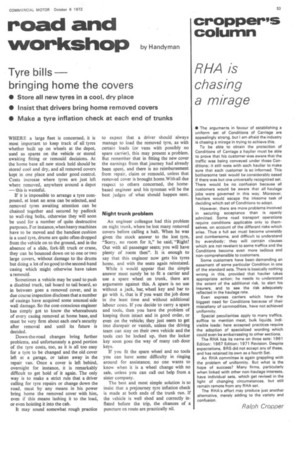cropper's column RHA is chasing a mirage
Page 55

If you've noticed an error in this article please click here to report it so we can fix it.
• The arguments in favour of establishing a uniform set of Conditions of Carriage are appealingly strong, but I am afraid the industry is chasing a mirage in trying to achieve this.
To be able to obtain the protection of Conditions of Carriage a haulier roust be able to prove that his customer was aware that the traffic was being conveyed under those Conditions: it still rests with each haulier to make sure that each customer is so informed. This bothersome task would be considerably eased if there was but one universally recognized set. There would be no confusion because all customers would be aware that all haulage jobs were governed in this way. Moreover, hauliers would escape the irksome task of deciding which set of Conditions to adopt.
However, there are more problems involved in securing acceptance than is openly admitted. Some road transport operations require conditions applicable only to themselves, on account of the different risks which arise. Thus a full set must become unwieldy and cumbersome, and difficult to understand by everybody; they will contain clauses which are not revelant to some traffics and the Conditions become even more tedious and non-comprehensible to customers.
Some customers have been demanding an easement of some particular Condition in one of the standard sets. There is basically nothing wrong in this, provided that haulier takes appropriate action; he needs to understand the extent of the additional risk, to alert his insurers, and to see the risk adequately reflected in the haulage rate.
Even express carriers which have the biggest need for Conditions because of their miscellany of commodities, have not achieved uniformity.
Special peculiarities apply to many traffics, suffice to mention meat, bulk liquids, indivisible loads; here accepted practices require the adoption of specialized wording which could even be embarrassing to other sections.
The RHA has its name on three sets: 1961 Edition: 1967 Edition; 1971 Revision. Despite expectations, S did not accept any of these, and has retained its own as a fourth Set.
An RHA committee is again grappling with the problem of uniformity. But what is the hope of success? Many firms, particularly when linked with other non-haulage interests, have individual sets, which get revised in the light of changing circumstances, but still remain remote from any RHA set.
The RHA's effort may produce just another alternative, merely adding to the variety and confusion.






































































































